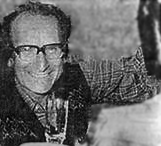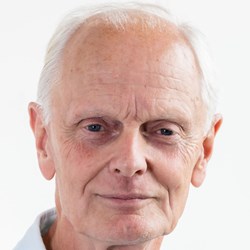Related Research Articles

Sir Cyril Astley Clarke, KBE, FRCP, FRCOG, (Hon) FRC Path, FRS was a British physician, geneticist and lepidopterist. He was honoured for his pioneering work on prevention of Rh disease of the newborn, and also for his work on the genetics of the Lepidoptera.

Sir Gustav Victor Joseph Nossal is an Austrian-born Australian research biologist. He is famous for his contributions to the fields of antibody formation and immunological tolerance.

César Milstein, CH, FRS was an Argentine biochemist in the field of antibody research. Milstein shared the Nobel Prize in Physiology or Medicine in 1984 with Niels Kaj Jerne and Georges J. F. Köhler for developing the hybridoma technique for the production of monoclonal antibodies.

Sir Gregory Paul Winter is a Nobel Prize-winning English molecular biologist best known for his work on the therapeutic use of monoclonal antibodies. His research career has been based almost entirely at the MRC Laboratory of Molecular Biology and the MRC Centre for Protein Engineering, in Cambridge, England.

Robert Royston Amos Coombs was a British immunologist, co-discoverer of the Coombs test (1945) used for detecting antibodies in various clinical scenarios, such as Rh disease and blood transfusion.
Alan James Munro is a British immunologist and entrepreneur who served as the Master of Christ's College, Cambridge (1995–2002).
Sir David Keith Peters is a retired Welsh physician and academic. He was Regius Professor of Physic at the University of Cambridge from 1987 to 2005, where he was also head of the School of Clinical Medicine.
Anne Cooke, is a British biologist and academic, specialising in immunology and autoimmune diseases. From 2000 to 2013, she was Professor of Immunobiology at the University of Cambridge. She was a fellow of King's College, Cambridge, between 1992 and 2013.
The Sir William Dunn School of Pathology is a department within the University of Oxford. Its research programme includes the cellular and molecular biology of pathogens, the immune response, cancer and cardiovascular disease. It teaches undergraduate and graduate courses in the medical sciences.
Geoffrey Lilley Smith FRS FMedSci FRSB is a British virologist and medical research authority in the area of Vaccinia virus and the family of Poxviruses. Since 1 October 2011 he is head of the Department of Pathology at the University of Cambridge and a principal research fellow of the Wellcome Trust. Before that, he was head of the Department of Virology at Imperial College London.

Lloyd John Old was one of the founders and standard-bearers of the field of cancer immunology. When Old began his career in 1958, tumor immunology was in its infancy. Today, cancer immunotherapies are emerging as a significant advance in cancer therapy.

Sir Robert Muir, FRS, FRSE, FRCP, FRCPE, FRFPSG was a Scottish physician and pathologist who carried out pioneering work in immunology, and was one of the leading figures in medical research in Glasgow in the early 20th century.

Sir James Learmonth "Jim" Gowans was a British physician and immunologist. In 1945, while studying medicine at King's College Hospital, he assisted at the liberated Bergen-Belsen concentration camp as a voluntary medical student.

Tolerx, Inc. was a biopharmaceutical company headquartered in Cambridge, Massachusetts. The company was focused on discovering and developing new therapies designed to treat patients by reprogramming the immune system, allowing for long-term remission of immune-related diseases after a short course of therapy. Targeted diseases include type 1 diabetes, rheumatoid arthritis, Inflammatory bowel disease (IBD), cancer, chronic and viral diseases. In 2008, Tolerx was named one of Fierce Biotech’s Fierce 15. In October 2011, Tolerx was shut down due to an unsuccessful Phase III trial in patients recently diagnosed with Type 1 diabetes.
Short Course Immune Induction Therapy or SCIIT, is a therapeutic strategy employing rapid, specific, short term-modulation of the immune system using a therapeutic agent to induce T-cell non-responsiveness, also known as operational tolerance. As an alternative strategy to immunosuppression and antigen-specific tolerance inducing therapies, the primary goal of SCIIT is to re-establish or induce peripheral immune tolerance in the context of autoimmune disease and transplant rejection through the use of biological agents. In recent years, SCIIT has received increasing attention in clinical and research settings as an alternative to immunosuppressive drugs currently used in the clinic, drugs which put the patients at risk of developing infection, cancer, and cardiovascular disease.
Sir Gordon William Duff, is a British medical scientist and academic. He was principal of St Hilda's College, Oxford, from 2014 to 2021. He was Lord Florey Professor of Molecular Medicine at the University of Sheffield from 1991 to 2014.

Henry Roy Dean, MD, LL.D, D.Sc, FRCP, also known as Prof. H. R. Dean, was a professor of Pathology at the University of Cambridge and Master of Trinity Hall, Cambridge.

Terence Howard Rabbitts FRS FMedSci is currently Professor of Molecular Immunology at the Institute of Cancer Research, London.
Infectious tolerance is a term referring to a phenomenon where a tolerance-inducing state is transferred from one cell population to another. It can be induced in many ways; although it is often artificially induced, it is a natural in vivo process. A number of research deal with the development of a strategy utilizing this phenomenon in transplantation immunology. The goal is to achieve long-term tolerance of the transplant through short-term therapy.
Andrew John Timothy George, is Deputy Vice-Chancellor at Brunel University London and Professor of Immunology.
References
- ↑ Sir William Dunn School of Pathology: History Archived 2010-01-10 at the Wayback Machine (accessed 6 January 2009)
- ↑ Lincoln College, University of Oxford: Professor Herman Waldmann: Professor of Pathology (accessed 23 March 2010) Archived 2011-07-04 at the Wayback Machine
- ↑ Royal Society: Lists of Royal Society Fellows 1660–2007, accessed 1 May 2011 Archived 2011-10-03 at the Wayback Machine
- ↑ "Herman Waldmann". Cranfield University. Archived from the original on 22 March 2012. Retrieved 25 August 2011.
- ↑ Academy of Medical Sciences: Fellows: Professor Herman Waldmann (accessed 23 March 2010)
- ↑ University of Cambridge: 2008 Overview: Honorary degrees (accessed 23 March 2010)
- ↑ "Honorary members". www.immunology.org. British Society for Immunology.
- ↑ Royal Medal 2023